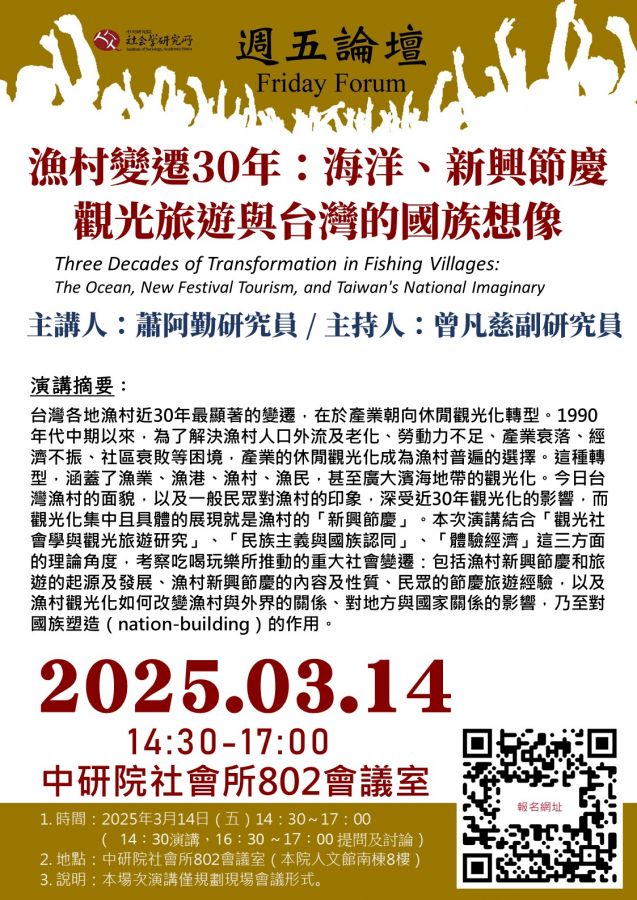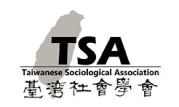中研院社會所3/14「漁村變遷30年:海洋、新興節慶觀光旅遊與台灣的國族想像」演講
2025-02-17
【講題】:漁村變遷30年:海洋、新興節慶觀光旅遊與台灣的國族想像
【講者】:蕭阿勤(中研院社會所研究員)
【主持】:曾凡慈(中研院社會所副研究員)
【時間】:2025年3月14日,14:30~17:00(14:30演講,16:30 - 17:00提問及討論)
【報名】:https://forms.gle/fb42rZdGPtMbv2mJA
【地點】:中央研究院社會學研究所802會議室(人文館南棟8樓)
【活動聯絡】:陳怡雯,carol0110@gate.sinica.edu.tw
【演講摘要】
台灣各地漁村近30年最顯著的變遷,在於產業朝向休閒觀光化轉型。1990年代中期以來,為了解決漁村人口外流及老化、勞動力不足、產業衰落、經濟不振、社區衰敗等困境,產業的休閒觀光化成為漁村普遍的選擇。這種轉型,涵蓋了漁業、漁港、漁村、漁民,甚至廣大濱海地帶的觀光化。今日台灣漁村的面貌,以及一般民眾對漁村的印象,深受近30年觀光化的影響,而觀光化集中且具體的展現就是漁村的「新興節慶」。本次演講結合「觀光社會學與觀光旅遊研究」、「民族主義與國族認同」、「體驗經濟」這三方面的理論角度,考察吃喝玩樂所推動的重大社會變遷:包括漁村新興節慶和旅遊的起源及發展、漁村新興節慶的內容及性質、民眾的節慶旅遊經驗,以及漁村觀光化如何改變漁村與外界的關係、對地方與國家關係的影響,乃至對國族塑造(nation-building)的作用。
【講者簡介】
蕭阿勤,現任中央研究院社會學研究所研究員、台灣史研究所合聘研究員,研究領域為民族主義、世代認同、歷史敘事、集體記憶、領土爭端、文化與鄉村旅遊,著有《回歸現實:台灣一九七0年代的戰後世代與文化政治變遷》、《重構台灣:當代民族主義的文化政治》、Contemporary Taiwanese Cultural Nationalism、Politics and Cultural Nativism in 1970s Taiwan: Youth, Narrative, Nationalism、《당대當代 타이완의 민족주의의 문화정치》;共同主編論文集《族群、民族與現代國家:經驗與理論的反思》、《記憶的紐帶:台灣的歷程》、Cultural, Ethnic, and Political Nationalism in Contemporary Taiwan: Bentuhua、Les Liens de la Memoire: Itineraires Taïwanais (The Bonds of Memory: Taiwanese Itineraries)。即將完成《體驗地方:海洋、漁村旅遊與台灣的國族想像》書稿。
【活動說明】
1. 本場次僅提供實體參與形式。
2. 14:30演講,16:30 - 17:00提問及討論。
…………………………………………………………………………………………………………………………………………………………………………………………
Three Decades of Transformation in Fishing Villages: The Ocean, New Festival Tourism, and Taiwan's National Imaginary
Speaker:A-Chin Hsiau (Research Fellow, Institute of Sociology, Academia Sinica)
Host:Fan-tzu Tseng (Associate Research Fellow, Institute of Sociology, Academia Sinica)
Time:2025-03-14 14:30~ 17:00
Location:8F, Room802, Institute of Sociology, South Wing, Humanities and Social Sciences Building, Academia Sinica Registration Link:https://forms.gle/fb42rZdGPtMbv2mJA
Contact:I-Wen Chen,carol0110@gate.sinica.edu.tw
Brief:
Over the past 30 years, the most significant transformation in fishing villages across Taiwan has been the shift towards a leisure and tourism-oriented industry. Since the mid-1990s, to address challenges such as population outflow, aging demographics, labor shortages, industrial decline, economic stagnation, and community decay, the leisure and tourism model has become a widespread solution for Taiwan's fishing villages. This transformation has involved various aspects, including fisheries, fishing ports, fishing villages, fishermen, and even the broader coastal areas. The current landscape of Taiwan’s fishing villages and the general public’s perception of them have been deeply influenced by nearly 30 years of tourism development, with a concrete manifestation of this tourism being the rapid growth of "new festivals" in these villages. This lecture integrates theoretical perspectives from sociology of tourism, nationalism studies, and "experience economy" to examine major social changes driven by tourism. Topics that will be discussed include the origins and development of new festivals and tourism in fishing villages, the content and nature of these new festivals, the public’s festival tourism experiences, as well as how tourism has altered the relationship between fishing villages and the outside world. The lecture also explores the impact of fishing village tourism on the relationships between local communities and the state and its role in nation-building.
Speaker:A-Chin Hsiau (Research Fellow and Professor, Institute of Sociology, Academia Sinica) A-chin HSIAU is a research fellow and professor at the Institute of Sociology, Academia Sinica. He works on the areas of nationalism, generational identity, historical narrative, collective memory, territorial disputes, and cultural and rural tourism. He is the author of Contemporary Taiwanese Cultural Nationalism (2000), Politics and Cultural Nativism in 1970s Taiwan: Youth, Narrative, Nationalism (2021), Return to Reality: Political and Cultural Change in 1970s Taiwan and the Postwar Generation (in Chinese, 2nd edition, 2010), Reconstructing Taiwan: Contemporary Cultural Politics of Nationalism (in Chinese, 2012), and Contemporary Cultural Politics of Taiwanese Nationalism (in Korean, 2024). He is the co-editor of Cultural, Ethnic, and Political Nationalism in Contemporary Taiwan: Bentuhua (2005), Ethnicity, Nation, and the Modern State: Rethinking Theory and Experience in Taiwan and China (in Chinese, 2016), Les Liens de la Memoire: Itineraires Taïwanais (2024), and The Bonds of Memory: Taiwanese Itineraries (in Chinese, forthcoming). He is about to finish a book in Chinese entitled Experiencing the Local: the Ocean, Fishing Village Tourism, and Taiwan's National Imaginary.

【講者】:蕭阿勤(中研院社會所研究員)
【主持】:曾凡慈(中研院社會所副研究員)
【時間】:2025年3月14日,14:30~17:00(14:30演講,16:30 - 17:00提問及討論)
【報名】:https://forms.gle/fb42rZdGPtMbv2mJA
【地點】:中央研究院社會學研究所802會議室(人文館南棟8樓)
【活動聯絡】:陳怡雯,carol0110@gate.sinica.edu.tw
【演講摘要】
台灣各地漁村近30年最顯著的變遷,在於產業朝向休閒觀光化轉型。1990年代中期以來,為了解決漁村人口外流及老化、勞動力不足、產業衰落、經濟不振、社區衰敗等困境,產業的休閒觀光化成為漁村普遍的選擇。這種轉型,涵蓋了漁業、漁港、漁村、漁民,甚至廣大濱海地帶的觀光化。今日台灣漁村的面貌,以及一般民眾對漁村的印象,深受近30年觀光化的影響,而觀光化集中且具體的展現就是漁村的「新興節慶」。本次演講結合「觀光社會學與觀光旅遊研究」、「民族主義與國族認同」、「體驗經濟」這三方面的理論角度,考察吃喝玩樂所推動的重大社會變遷:包括漁村新興節慶和旅遊的起源及發展、漁村新興節慶的內容及性質、民眾的節慶旅遊經驗,以及漁村觀光化如何改變漁村與外界的關係、對地方與國家關係的影響,乃至對國族塑造(nation-building)的作用。
【講者簡介】
蕭阿勤,現任中央研究院社會學研究所研究員、台灣史研究所合聘研究員,研究領域為民族主義、世代認同、歷史敘事、集體記憶、領土爭端、文化與鄉村旅遊,著有《回歸現實:台灣一九七0年代的戰後世代與文化政治變遷》、《重構台灣:當代民族主義的文化政治》、Contemporary Taiwanese Cultural Nationalism、Politics and Cultural Nativism in 1970s Taiwan: Youth, Narrative, Nationalism、《당대當代 타이완의 민족주의의 문화정치》;共同主編論文集《族群、民族與現代國家:經驗與理論的反思》、《記憶的紐帶:台灣的歷程》、Cultural, Ethnic, and Political Nationalism in Contemporary Taiwan: Bentuhua、Les Liens de la Memoire: Itineraires Taïwanais (The Bonds of Memory: Taiwanese Itineraries)。即將完成《體驗地方:海洋、漁村旅遊與台灣的國族想像》書稿。
【活動說明】
1. 本場次僅提供實體參與形式。
2. 14:30演講,16:30 - 17:00提問及討論。
…………………………………………………………………………………………………………………………………………………………………………………………
Three Decades of Transformation in Fishing Villages: The Ocean, New Festival Tourism, and Taiwan's National Imaginary
Speaker:A-Chin Hsiau (Research Fellow, Institute of Sociology, Academia Sinica)
Host:Fan-tzu Tseng (Associate Research Fellow, Institute of Sociology, Academia Sinica)
Time:2025-03-14 14:30~ 17:00
Location:8F, Room802, Institute of Sociology, South Wing, Humanities and Social Sciences Building, Academia Sinica Registration Link:https://forms.gle/fb42rZdGPtMbv2mJA
Contact:I-Wen Chen,carol0110@gate.sinica.edu.tw
Brief:
Over the past 30 years, the most significant transformation in fishing villages across Taiwan has been the shift towards a leisure and tourism-oriented industry. Since the mid-1990s, to address challenges such as population outflow, aging demographics, labor shortages, industrial decline, economic stagnation, and community decay, the leisure and tourism model has become a widespread solution for Taiwan's fishing villages. This transformation has involved various aspects, including fisheries, fishing ports, fishing villages, fishermen, and even the broader coastal areas. The current landscape of Taiwan’s fishing villages and the general public’s perception of them have been deeply influenced by nearly 30 years of tourism development, with a concrete manifestation of this tourism being the rapid growth of "new festivals" in these villages. This lecture integrates theoretical perspectives from sociology of tourism, nationalism studies, and "experience economy" to examine major social changes driven by tourism. Topics that will be discussed include the origins and development of new festivals and tourism in fishing villages, the content and nature of these new festivals, the public’s festival tourism experiences, as well as how tourism has altered the relationship between fishing villages and the outside world. The lecture also explores the impact of fishing village tourism on the relationships between local communities and the state and its role in nation-building.
Speaker:A-Chin Hsiau (Research Fellow and Professor, Institute of Sociology, Academia Sinica) A-chin HSIAU is a research fellow and professor at the Institute of Sociology, Academia Sinica. He works on the areas of nationalism, generational identity, historical narrative, collective memory, territorial disputes, and cultural and rural tourism. He is the author of Contemporary Taiwanese Cultural Nationalism (2000), Politics and Cultural Nativism in 1970s Taiwan: Youth, Narrative, Nationalism (2021), Return to Reality: Political and Cultural Change in 1970s Taiwan and the Postwar Generation (in Chinese, 2nd edition, 2010), Reconstructing Taiwan: Contemporary Cultural Politics of Nationalism (in Chinese, 2012), and Contemporary Cultural Politics of Taiwanese Nationalism (in Korean, 2024). He is the co-editor of Cultural, Ethnic, and Political Nationalism in Contemporary Taiwan: Bentuhua (2005), Ethnicity, Nation, and the Modern State: Rethinking Theory and Experience in Taiwan and China (in Chinese, 2016), Les Liens de la Memoire: Itineraires Taïwanais (2024), and The Bonds of Memory: Taiwanese Itineraries (in Chinese, forthcoming). He is about to finish a book in Chinese entitled Experiencing the Local: the Ocean, Fishing Village Tourism, and Taiwan's National Imaginary.




